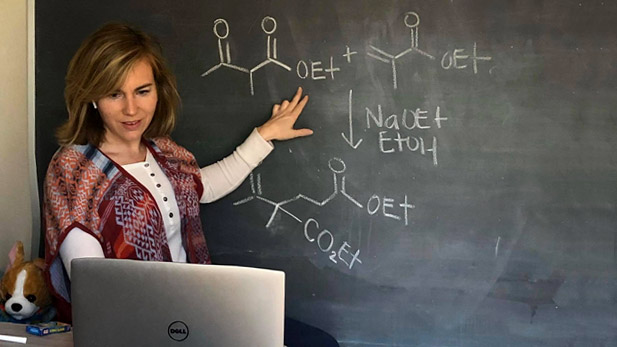DeVasher Mixes Right Online Chemical Formula
Tuesday, April 07, 2020

Chemistry and biochemistry professor Rebecca DeVasher keeps things simple in her online classes, using a conventional blackboard to demonstrate a topic in her advanced organic chemistry course.
Rose-Hulman’s core mission to provide its students with the world’s best undergraduate science, engineering and mathematics education in an environment of individual attention and support is continuing online as professors have adapted course materials in a variety of topics.
Much to the appreciation of their students.
When reports of the coronavirus started emanating from China, chemistry and biochemistry professor Rebecca DeVasher started developing do-it-yourself virtual and simulated laboratory projects for her classes. She worked with the Labster online lab depository to provide free virtual labs that engage her students with interesting and educational organic chemistry and research activities.
DeVasher also is accentuating online classroom chat sessions by involving Rose-Hulman alumni who are currently working in chemistry, biochemistry, and chemical engineering fields. These alumni and students discuss how classroom content—like the transition of milligram benchtop syntheses to the kiloton manufacture scale—is relative to real-world projects and products.
“Process chemistry is a viable occupation for our students and I want them to see this side of the organic lab,” says DeVasher. “In this way, students can see how organic chemistry can add value to markets and human lives. Now, more than ever, it is critically important that everyone knows something about science.”
DeVasher has been pleasantly surprised by how her students have enjoyed aspects of the new online learning environment. One of her Organic Chemistry III students recently sent her a note stating: “I just wanted to let you know that I am grateful to have you in class this quarter. You have made this transition more normal than I thought possible.”
The student continued, “Your efforts are so evident! I love your humor and your love for your students. Thanks for all you do.”
DeVasher has been grateful for the opportunities as well. “My students have been amazing. Some of the feedback from them has been so uplifting,” she says. “The fact that they have the generosity of spirit and maturity to thank me for my work is just so impressive.”
Later, she adds, “Transitioning to online instruction was tough. There is a lot of work involved and I’ve found it’s really important to stick to the fundamentals of what I’ve learned over the years at Rose-Hulman: Put student engagement first and DO NOT overthink the small stuff.”
DeVasher leads an active research program in green chemistry, which seeks to develop new methods and technologies that reduce or eliminate the use of hazardous chemicals. She is involved with various sustainability initiatives on campus, and has been a faculty mentor to visiting high school students completing science projects in Rose-Hulman’s Operation Catapult and Project Select summer STEM exploration programs.
Much to the appreciation of their students.
When reports of the coronavirus started emanating from China, chemistry and biochemistry professor Rebecca DeVasher started developing do-it-yourself virtual and simulated laboratory projects for her classes. She worked with the Labster online lab depository to provide free virtual labs that engage her students with interesting and educational organic chemistry and research activities.
DeVasher also is accentuating online classroom chat sessions by involving Rose-Hulman alumni who are currently working in chemistry, biochemistry, and chemical engineering fields. These alumni and students discuss how classroom content—like the transition of milligram benchtop syntheses to the kiloton manufacture scale—is relative to real-world projects and products.
“Process chemistry is a viable occupation for our students and I want them to see this side of the organic lab,” says DeVasher. “In this way, students can see how organic chemistry can add value to markets and human lives. Now, more than ever, it is critically important that everyone knows something about science.”
DeVasher has been pleasantly surprised by how her students have enjoyed aspects of the new online learning environment. One of her Organic Chemistry III students recently sent her a note stating: “I just wanted to let you know that I am grateful to have you in class this quarter. You have made this transition more normal than I thought possible.”
The student continued, “Your efforts are so evident! I love your humor and your love for your students. Thanks for all you do.”
DeVasher has been grateful for the opportunities as well. “My students have been amazing. Some of the feedback from them has been so uplifting,” she says. “The fact that they have the generosity of spirit and maturity to thank me for my work is just so impressive.”
Later, she adds, “Transitioning to online instruction was tough. There is a lot of work involved and I’ve found it’s really important to stick to the fundamentals of what I’ve learned over the years at Rose-Hulman: Put student engagement first and DO NOT overthink the small stuff.”
DeVasher leads an active research program in green chemistry, which seeks to develop new methods and technologies that reduce or eliminate the use of hazardous chemicals. She is involved with various sustainability initiatives on campus, and has been a faculty mentor to visiting high school students completing science projects in Rose-Hulman’s Operation Catapult and Project Select summer STEM exploration programs.